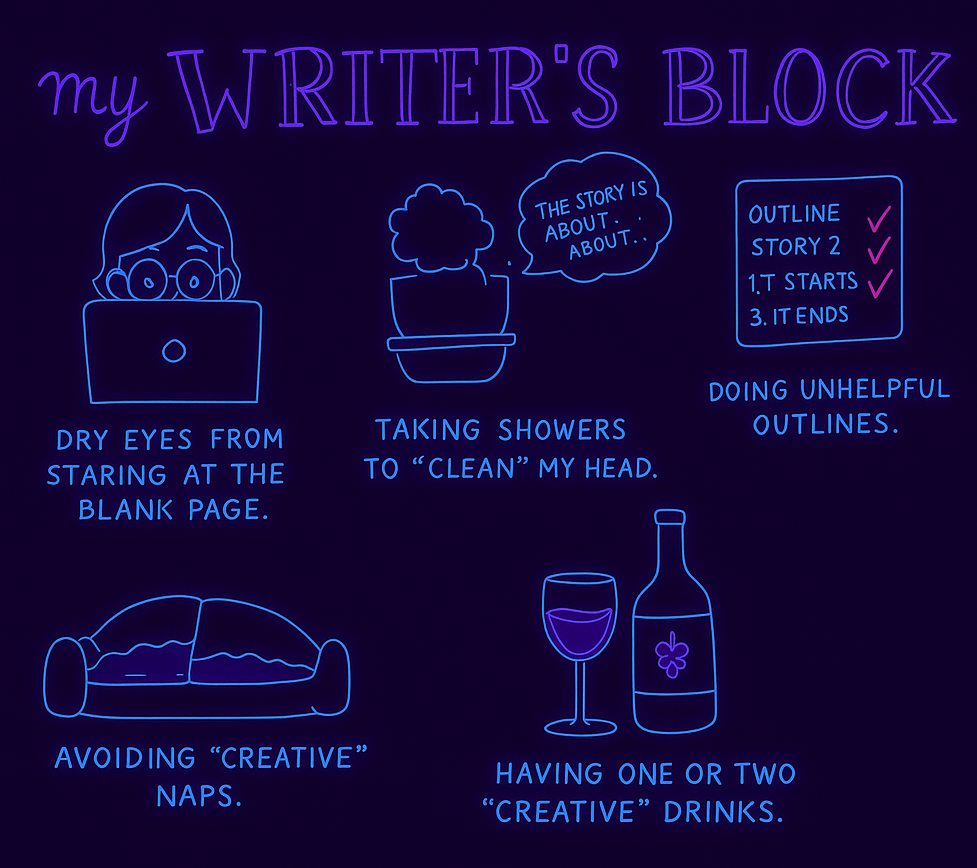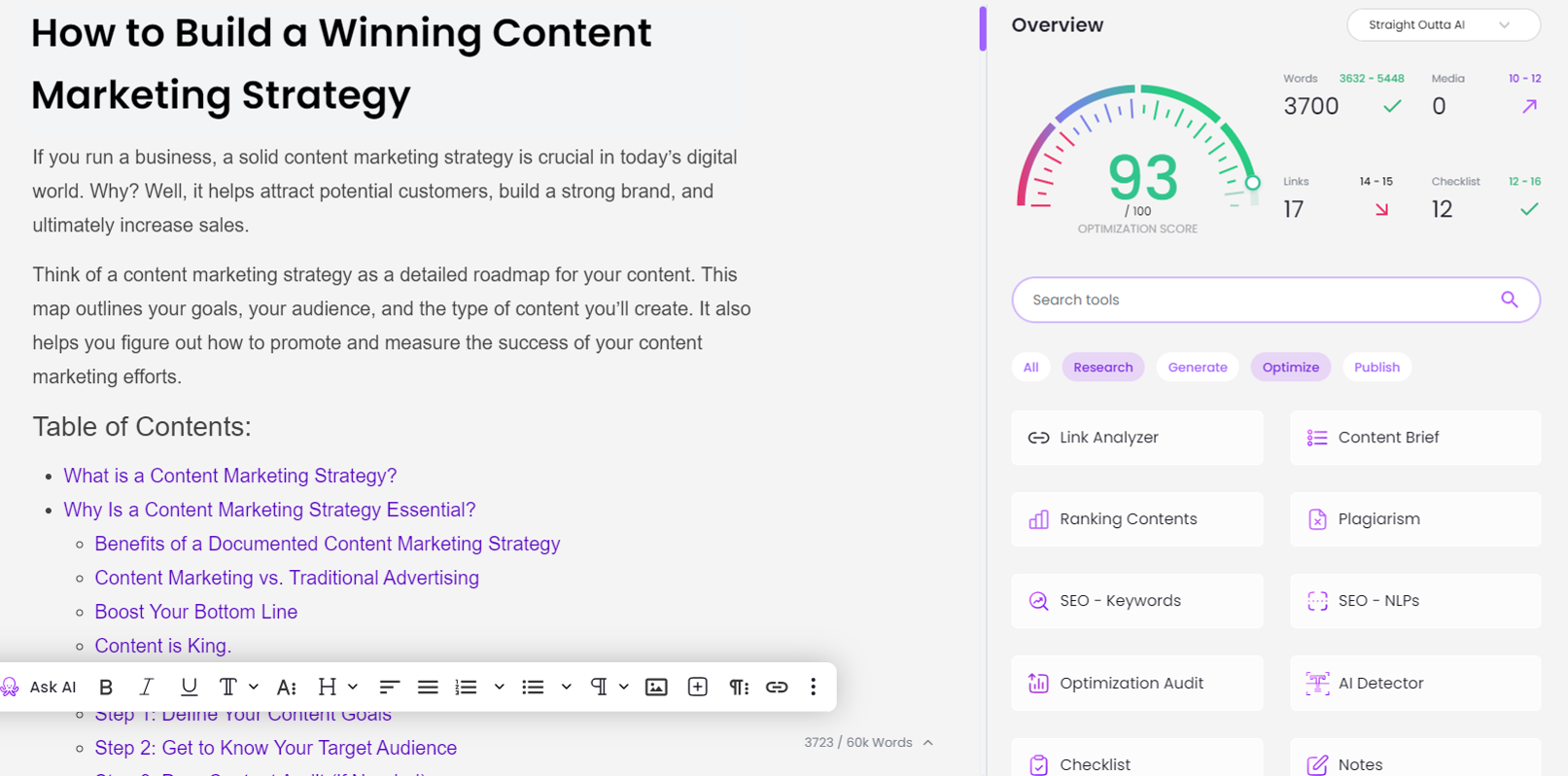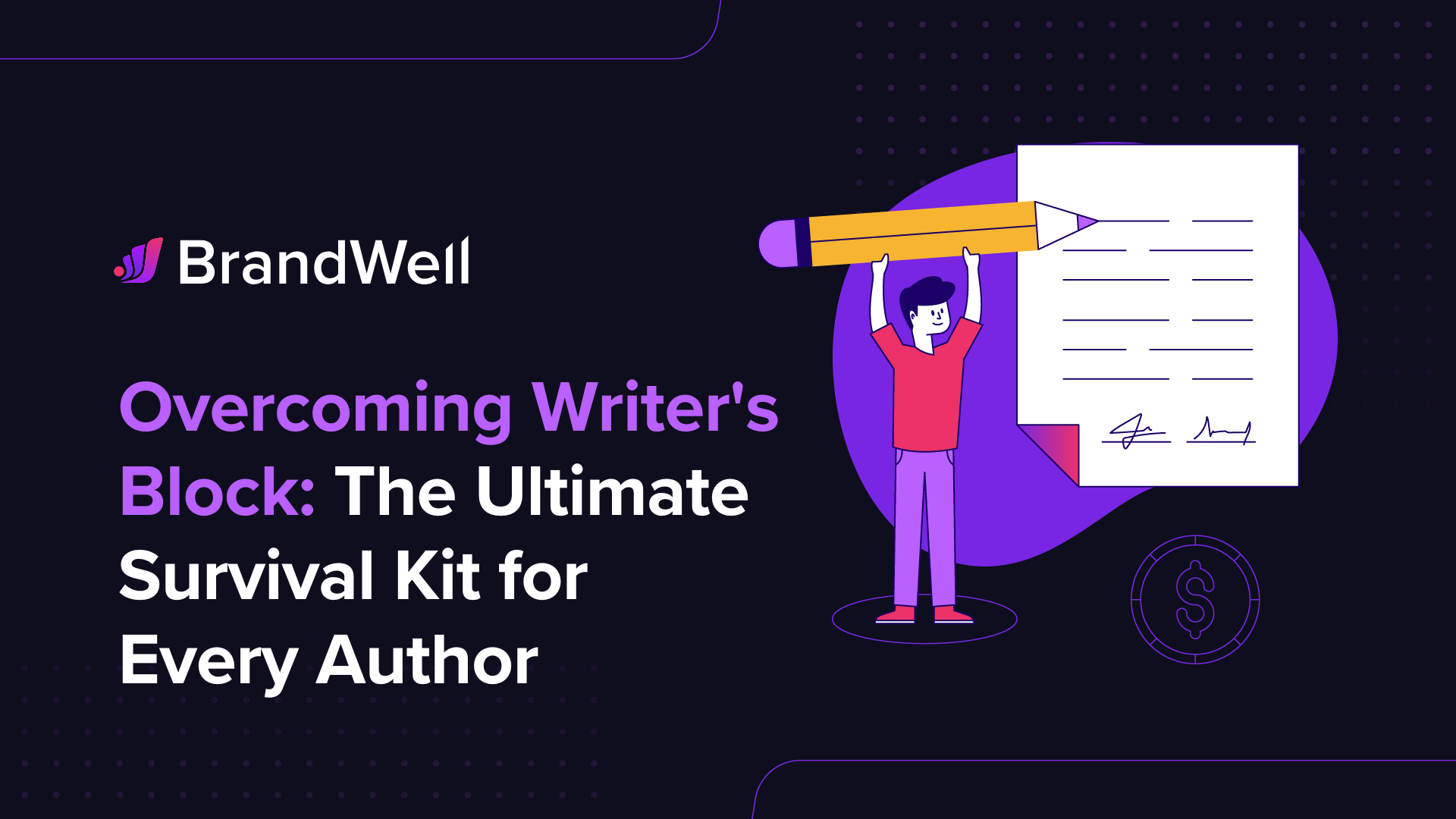Have you ever experienced the dreaded writer’s block? It can be a frustrating experience that stalls creativity and leaves us feeling stuck.
Writer’s block is a common phenomenon. A 2017 study revealed that 70% of students experienced writer’s block occasionally while 24% nearly always have it.
Although most research is focused on academics, writer’s block is prevalent in any profession involving writing.
So what do you do when you get writer’s block?
There are plenty of things to do to break through the mental roadblock and continue writing. In this blog post, we’ll look into the causes and symptoms of writer’s block and some of the best practices to overcome it.
Table of Contents:
What is Writer’s Block?
Writer’s block is the inability to produce new work or move forward with writing.
Writer’s block can be a frustrating — and often debilitating — experience that affects writers of all levels. Whether you’re a blogger, novelist, or content creator, hitting a mental wall can feel overwhelming.
Symptoms of writer’s block
Writer’s block manifests in different ways for different people. Some common signs include:
- Staring at a blank page without knowing where to start
- Constantly deleting or rewriting sentences without making progress
- Feeling mentally exhausted when thinking about writing
- Struggling to generate new ideas
- Procrastinating or avoiding writing tasks altogether
- Unable to focus on one project at a time
- Feeling guilty about not being able to produce quality work
Recognizing these symptoms early can help you take proactive steps to overcome them.

So what causes writer’s block?
Writer’s block can be caused by a variety of factors, both internal and external. Here are some of the most common causes:
- Perfectionism: Many writers struggle with the pressure of producing flawless work. The fear of not meeting high expectations can lead to hesitation and self-doubt, making it difficult to start or continue writing.
- Fear of Failure or Criticism: Worrying about how others will judge your work can be paralyzing. This fear can make you second-guess every word and stop you from expressing your ideas freely.
- Lack of Inspiration or Ideas: Sometimes, writers simply feel uninspired or struggle to generate new ideas. This can be due to creative burnout, lack of new experiences, or not engaging with stimulating content.
- Stress and Anxiety: Mental health plays a huge role in creativity. High levels of stress, anxiety, or personal struggles can make it difficult to focus and feel motivated to write.
- Distractions and Overstimulation: A cluttered environment, excessive screen time, and social media distractions can make it hard to concentrate and get into a creative flow.
- Fatigue and Burnout: Overworking or not getting enough rest can drain your mental energy, making it harder to write. Creativity thrives when the mind is well-rested.
- Lack of Structure or Routine: Writing sporadically without a set schedule can make it harder to get into a flow. Without a routine, it’s easy to procrastinate or lose momentum.
- Overthinking the Process: Some writers get stuck in endless planning and overanalyzing every word, which prevents them from making progress. Writing is often about letting ideas flow without constant self-editing.
- External Pressures: Sometimes, external demands like tight deadlines, audience expectations, or pressure from clients or publishers can make writing feel like a chore rather than a creative process.
Writer’s block can be annoying especially if you have deadlines to meet and the words are not just flowing.
But here’s the good news: writer’s block is not permanent. With the right strategies, you can beat it and even prevent it from happening.

Common Myths About Writer’s Block
Many misconceptions about writer’s block can make it seem more daunting than it actually is. Let’s debunk a few:
Myth #1: Great writers don’t get writer’s block.
Nope, not true! Even the most famous authors have struggled with it.
Ernest Hemingway, Maya Angelou, and even Stephen King have all hit creative roadblocks.
The difference? They pushed through it with persistence and strategy.
So, if you’re stuck, you’re actually in good company.
Myth #2: You have to wait for inspiration to strike.
If every writer waited for that magical lightning bolt of inspiration, we’d have way fewer books, movies, and articles in the world.
Writing is like working out — you’ve got to show up even when you don’t feel like it.
The act of writing itself often sparks inspiration, not the other way around.
Myth #3: If you have writer’s block, you’re not a real writer.
This is one of the most damaging myths. Writer’s block isn’t a sign that you’re not cut out for writing; it’s just a temporary hiccup.
Even the best mechanics have trouble with cars sometimes, and even the best chefs burn a dish now and then.
Writing is a skill, not a supernatural gift that flows endlessly.
Myth #4: Writer’s block lasts forever.
It may feel like it, but writer’s block is not permanent. The key is to actively work through it instead of waiting for it to go away on its own.
There are countless strategies (which we’ll get into) that can help you break free and get back to writing.
Myth #5: There’s only one right way to overcome writer’s block.
What works for one writer may not work for another. Some swear by freewriting, others need a strict routine, and some just take a walk and come back refreshed.
The important thing is to experiment and find what helps you personally.
How to Overcome Writer’s Block
There is no single cure for writer’s block, but these strategies can help get you unstuck:
1. Change Your Environment
A change of scenery can work wonders.
If you usually write at your desk, try moving to a different room, a coffee shop, or even outside. A new setting can refresh your mind and spark new ideas.
Some writers even find that working in a slightly noisy environment (like a bustling café) helps them focus better than complete silence.
2. Freewriting
One of the best ways to break out of a creative rut is to just start writing — anything.
Set a timer for 10-15 minutes and write whatever comes to mind. Don’t worry about grammar, coherence, or whether it even makes sense. The goal is to let your thoughts flow freely.
More often than not, this exercise unlocks hidden ideas and gets the creative juices flowing.
3. Set Small, Achievable Goals
Big writing projects can feel overwhelming, making it easier to procrastinate.
Instead of telling yourself, “I need to write an entire chapter today,” set a goal to write just one paragraph.
Once you achieve that small goal, you’ll likely feel more motivated to continue.
4. Write Badly on Purpose
Perfectionism is a major contributor to writer’s block. Allow yourself to write an awful first draft.
No one has to see it except you! The key is to get words on the page — polishing and refining can always come later.
5. Read or Engage with Other Content
If your creative well feels dry, fill it up by consuming content.
Read books, watch movies, listen to podcasts, or even browse art galleries.
Inspiration often comes from unexpected sources, and exposing yourself to new ideas can reignite your passion for writing.
6. Talk It Out
Stuck on an idea? Try talking it out with a friend, mentor, or even yourself!
Explain your thoughts out loud or record a voice memo.
Verbalizing your ideas can help clarify them and make it easier to get them down on paper.
7. Use Writing Prompts
Writing prompts are a great way to kickstart your creativity when you don’t know where to begin.
There are countless prompt generators online, or you can create your own by jotting down random words and weaving them into a story or article.
If you’re struggling with an essay assignment, look through magazines or online articles for inspiration.
Brainstorming is another great tool that can help break through writer’s block. One popular technique is mind mapping or drawing a map of related topics around the main idea to explore different angles and perspectives on the subject. This can be especially helpful when writing complex topics such as social justice or scientific research papers.
8. Change Your Writing Medium
If you usually type on a laptop, try writing by hand. If you normally use a notebook, switch to a whiteboard or voice-to-text software.
The simple act of changing how you write can help break through mental barriers.
9. Reward Yourself
Give yourself little rewards for making progress.
Finished a paragraph? Treat yourself to a snack.
Wrote 500 words? Watch an episode of your favorite show.
Positive reinforcement can make writing feel less like a chore and more like a rewarding experience.
10. Embrace Breaks, but Don’t Give Up
Sometimes, stepping away from your work for a short period can help you return with a fresh perspective.
Take a walk, stretch, or do a completely unrelated activity like listening to music or watching a motivational video.
However, make sure your break doesn’t turn into avoidance — set a specific time to return and keep going!

Preventing Writer’s Block
While writer’s block can happen to anyone, there are several ways to prevent it from taking hold in the first place.
The best approach is to build habits that keep your creative mind active and resilient.
Create a Writing Routine
Writing at the same time each day builds consistency and makes it easier to get started.
Start by setting small achievable goals that fit into your daily life. For example, if you want to write every day but don’t have the time for long sessions, set aside 15 minutes each morning before work or school to jot down ideas and make progress on your project.
Or if you prefer larger chunks of time dedicated solely to creativity, try blocking off an hour each weekend afternoon when there are no other commitments competing for your attention.
Whether it’s early in the morning, during lunch, or late at night, a routine makes writing feel less like a challenge and more like a natural habit.
Keep an Idea Journal
Ideas can strike at the most random times — in the shower, while driving, or in the middle of the night.
Keep a small notebook or use a notes app on your phone to capture ideas whenever they come. This way, you’ll always have something to reference when you feel stuck.
Take Breaks
Burnout is a major cause of writer’s block. Make sure to take short breaks during writing sessions and schedule days off to recharge.
Sometimes, stepping away for a while can actually improve productivity in the long run.
It’s important not only to take regular breaks from work but also from creative projects as well. Schedule some downtime between tasks so that when it comes time to start again, you can approach things with renewed energy and enthusiasm instead of feeling drained and uninspired.
Set Realistic Goals
Unrealistic expectations can lead to frustration. Instead of aiming to write an entire novel in a month, break it down into manageable milestones.
Setting achievable goals helps maintain momentum and reduces stress.
Find a Writing Community
Surrounding yourself with other writers — whether online or in person — can provide motivation, feedback, and accountability.
Writing groups and forums offer a support system to help keep you on track.
Reduce Distractions
It’s easy to get derailed by social media, email, or notifications. Create a distraction-free writing zone by turning off your phone, using website blockers, or working in a quiet space.
Work in a relaxed atmosphere devoid of diversions so that you can stay focused on the job without disruption. Whether it’s a desk in the corner of your bedroom or an outdoor patio with plenty of natural light and fresh air, make sure your work area feels inviting so you feel inspired rather than overwhelmed by the task ahead of you.
Establish a Pre-Writing Ritual
A ritual can signal to your brain that it’s time to write. This could be making a cup of coffee, listening to a specific playlist, stretching, or meditating before getting started.

Self-Care Practices to Beat Writer’s Block
Taking care of yourself mentally and physically can make a huge difference in overcoming and preventing writer’s block.
Here are some self-care strategies that can help:
1. Get Enough Sleep
A tired brain is a sluggish brain. Aim for 7–9 hours of sleep per night to keep your mind sharp and creativity flowing.
Poor sleep can lead to low energy, brain fog, and an overall lack of motivation.
2. Practice Mindfulness or Meditation
Taking a few minutes to meditate or practice deep breathing can help clear your mind and reduce stress, making it easier to focus on writing. Even five minutes of mindfulness can help you feel more grounded and present.
Practice deep breathing to slow down your heart rate and reduce tension in your muscles.
You can also do progressive muscle relaxation (PMR) which tenses up specific muscle groups before releasing them one at a time until your body feels relaxed.
Other self-care methods like guided imagery meditation, yoga, or tai chi can also help relieve stress associated with writer’s block.
3. Exercise Regularly
Physical movement isn’t just good for your body — it’s great for your brain, too.
Activities like walking, dancing, or even a quick stretching session can shake off mental fog and boost creativity.
Exercise helps reduce stress and keeps your mind fresh for writing sessions.
4. Engage in Non-Writing Creative Activities
Try painting, playing music, gardening, or even cooking. Engaging in other creative pursuits helps recharge your mind and might even inspire new writing ideas.
5. Stay Hydrated and Eat Well
Dehydration and poor nutrition can zap your energy and concentration. Make sure you’re fueling your body with nutritious foods and drinking plenty of water. Your brain will thank you!
6. Socialize and Connect
Spending time with friends or talking to other writers can provide new perspectives and inspiration.
Sometimes, stepping away from the solitary act of writing and engaging with others is all you need to break through mental barriers.
7. Reduce Stress and Prioritize Mental Health
Stress is a major creativity killer. Whether it’s work, personal life, or writing pressure, find ways to manage it — through journaling, therapy, or simply taking time for yourself.
8. Be Kind to Yourself
Lastly, don’t be too hard on yourself. Creativity ebbs and flows, and it’s okay to have off days. Trust that your ability to write will return, and be patient with the process.
If none of these strategies are working and your writer’s block persists despite all efforts, then professional help may be necessary. A therapist or coach specializing in creative processes could provide valuable insight into why the blocks occur and how best to manage them. They can also rule out any underlying medical issues that could be contributing to your writer’s block.

Beat Writer’s Block with Automation
Automation, particularly in the form of sophisticated content marketing platforms like BrandWell, can be a powerful ally in overcoming writer’s block.
Here’s how AI can help:
Idea Generation: AI can suggest a variety of ideas or angles to explore based on a given topic or theme. This can help to jumpstart the writing process by providing fresh perspectives or unexpected directions.
Research: No human can beat the ability of an AI model to crawl billions of data points within minutes. BrandWell can quickly gather and summarize relevant information on a given topic, reducing the time you spend on research so you can focus more on your content.
Outlining and Formatting: Article generation is the core of BrandWell. With its powerful AI long-form writer, it can generate entire articles that are already in the proper format — meaning having titles, headers, subheaders, an intro and a conclusion, and even a call to action. This can be especially helpful for projects that involve SEO where content structure is key.
Language and Style: AI tools can offer stylistic suggestions, helping refine your writing style and tone. They can also spot grammar, spelling, and syntax mistakes, ensuring that your text is coherent and readable.
Customization: AI tools can be tailored to individual writing styles and preferences, making the support they offer more effective and personal. With BrandWell, you can actually train the app to write in your tone of voice by inputting samples of your previous work.
Combating Repetitiveness: By analyzing existing text, AI can identify areas where your text may be repetitive or monotonous, suggesting alternatives to enhance variety and interest.
Overcoming Perfectionism: Sometimes, writer’s block arises from a fear of imperfection. AI-generated content can provide a starting point that’s easier to edit and improve upon, rather than starting from a blank page.
BrandWell is very easy to use — just enter a keyword or URL and the AI will “write” a long-form blog post for you within minutes. This post is almost ready to publish: it has a meta title, meta description, table of contents, well-structured H2-H6 headers, and even internal and external links!
Plus, you’ll have all the SEO tools you need to make your content truly unique and human-like.
 Remember: while AI can offer substantial help in overcoming writer’s block, the creative and critical aspects of writing ultimately rely on your human touch.
Remember: while AI can offer substantial help in overcoming writer’s block, the creative and critical aspects of writing ultimately rely on your human touch.
AI is a tool to augment and support your skills and ideas — not replace them.
FAQs – Overcoming Writer’s Block
What is the fastest way to cure writer’s block?
The fastest way to cure writer’s block is to start writing without overthinking. Try freewriting for 10-15 minutes, set small achievable goals, or change your environment. Moving away from perfectionism and allowing yourself to write badly can also help break through creative barriers.
What is the main cause of writer’s block?
The main cause of writer’s block is often self-doubt and fear of failure. Other common causes include stress, burnout, lack of inspiration, perfectionism, and external distractions. Identifying the root cause can help you take the right steps to overcome it.
How long does a writer’s block last?
Writer’s block can last anywhere from a few minutes to several weeks or even months. It depends on the underlying cause and how actively you try to overcome it. Using structured strategies like freewriting, changing routines, or practicing self-care can shorten its duration.
How to bypass writer’s block?
To bypass writer’s block, try writing something unrelated, such as journaling or brainstorming ideas. Set a timer for short writing sprints, change your writing location, or take a break to reset your mind. Removing distractions and lowering expectations can also help you regain momentum.
Conclusion
Writer’s block can be a difficult thing to overcome, but with the right tools and techniques, it is possible.
With creative exercises like free writing or journaling and self-care practices such as taking breaks or changing up your environment, you can beat writer’s block and get back on track with your writing projects.
If you’re stuck staring at a blank screen with a deadline looming, BrandWell could be the answer to overcoming writer’s block.
Simply enter your keyword or topic and get a full story, blog post, or ad copy within minutes. Check out how BrandWell makes it easy to automate the content creation process and rank well on search engines — while overcoming writer’s block.




